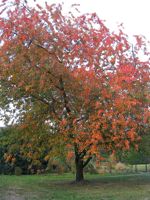Mon-Fri 9am - 5pm Mountain time
Black Cherry vs Prairie Skyrise Aspen
Prunus serotina
Populus tremuloides Prairie Skyrise
NOT AVAILABLE THIS SEASON - MIGHT RETURN
CUSTOM GROW
Black Cherry is common in eastern North America but a rare find elsewhere. This tree is shade tolerant and is often found in old fields, forest openings, and along fencerows.
The fruit is edible and is commonly used to flavor rum and brandy. It is also edible and often eaten fresh or used in wine or jelly. Black Cherry trees typically begin producing fruit when they are 10 years of age.
Black Cherry wood is a rich reddish-brown color and is strong, making it valued in cabinetry and woodworking. It is often used in reclamation as well.
The leaves can poison livestock as they contain cyanide derivatives and precursors. However, many have noted that deer still seem to browse their trees with impunity and birds and other animals eat the fruit when available.
Prairie Skyrise Aspen has a compact and columnar branching structure that makes it a great privacy screen for small yards. You'll notice that the old and new growth have contrasting colors of green, giving this tree an attractive and unique appearance.
Prairie Skyrise Aspen is more disease resistant, columnar, and typically leafs out earlier than Swedish Aspen.
Black Cherry Quick Facts
Prairie Skyrise Aspen Quick Facts
Toxicity: bark and wilted leaves toxic to livestock

